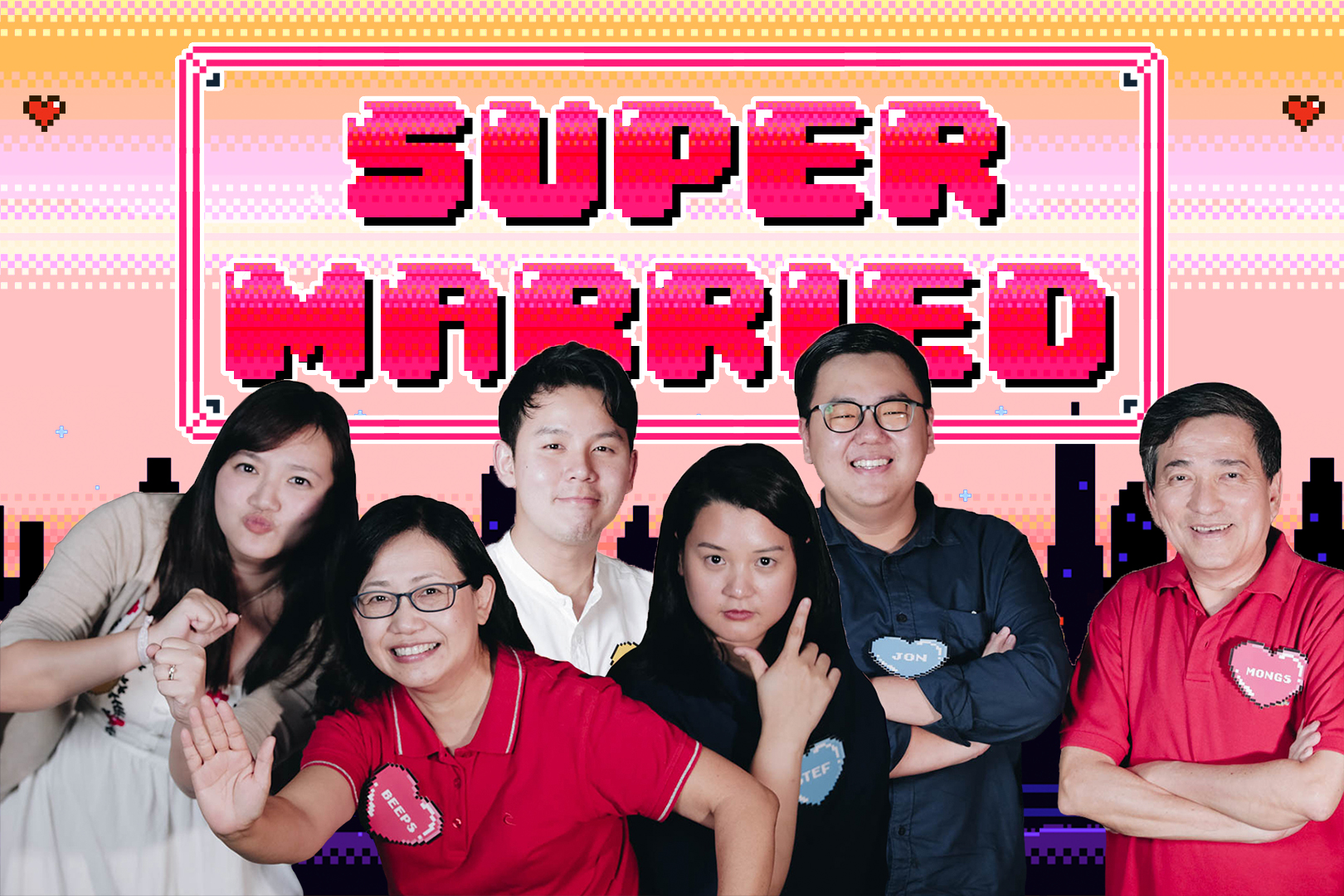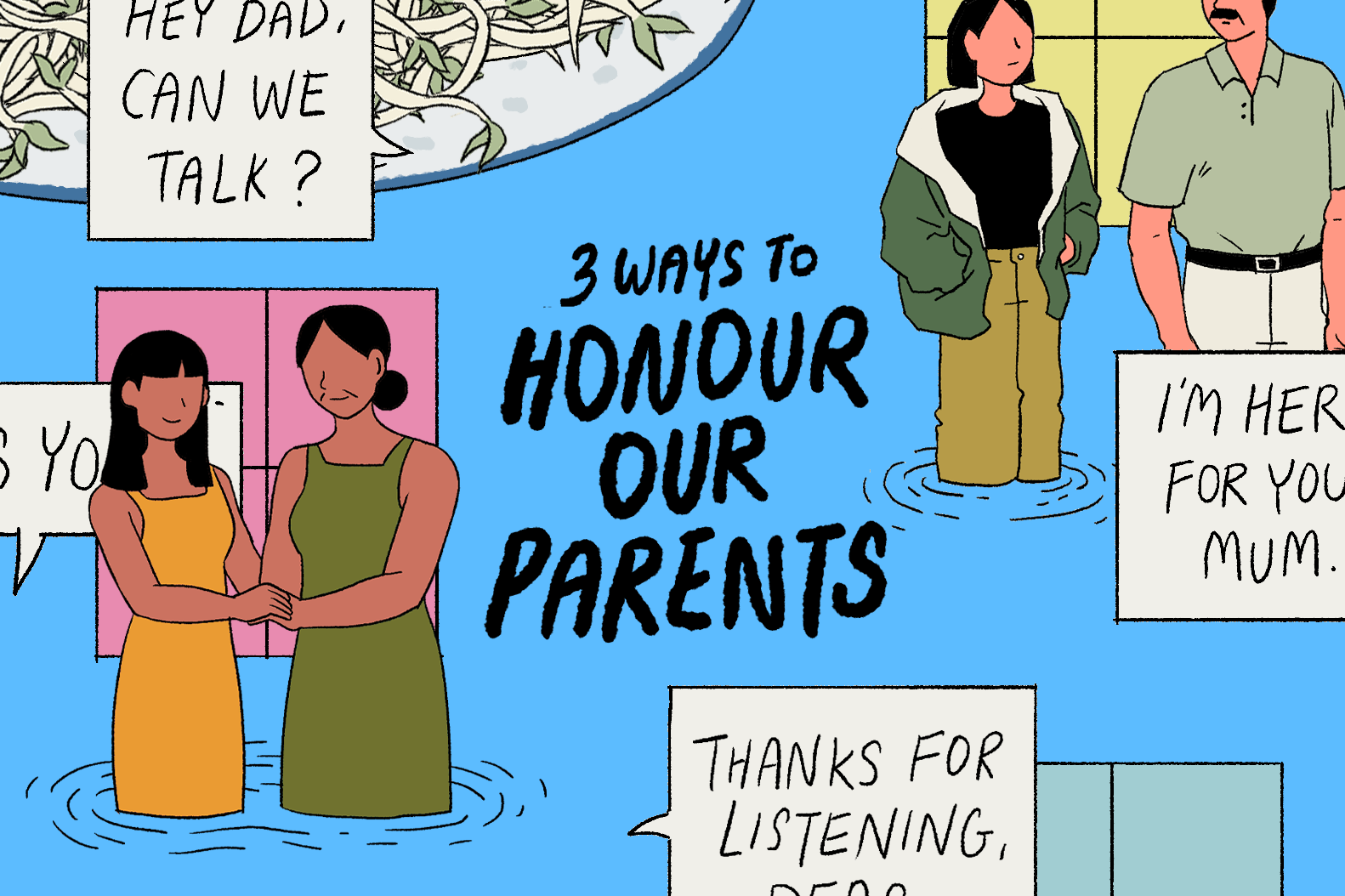This Valentine’s Day, we invited 3 special couples to join us for our very first game show: SUPERMARRIED.
With the face of marriage increasingly coloured by the lenses of social media, what does that mean for the way young people approach lifelong commitments? How can this generation raised on fast entertainment pace itself for the marathon of marriage?
Representing distinct points of the matrimonial life cycle are: Uncle Mongs and Aunty Beeps (32 years of marriage), Jon Cho and Dorea (4 years of marriage), and Jon Ho and Stef (newly engaged). To avoid any confusion, we’ll be referring to Jon Cho as “Cho” and Jon Ho as “Jon”.
Let the games begin!
HOW MARRIED ARE YOU?
SUPERMARRIED consists of 3 levels: Telepathy, Compatibility and Maturity. The younger couples revved to a start in the introductory Telepathy round, but it was Uncle Mongs and Aunty Beeps who impressed with their answers to Uncle Mongs’ favourite book of the Bible and Aunty Beeps’ all-time favourite movie.
For Level 2, the Compatibility round, couples worked as a team to answer open-ended questions. Each of them were posed different scenarios commonly faced in marriage – check out their answers below.

“A big part of our time is spent eating with our families,” Jon admitted with a laugh. “Every Tuesday is her family day and we come together to eat, share our stories and successes. On Sundays, she comes over.”
He said: “My pastor once told me that since she has a Tuesday thing with her family, I should keep it almost like a commandment and never miss it.”
Marrying someone isn’t just about committing to one person, but also the people who have made them who they are today.
Treating your (potential) spouse’s family as your own is important for thriving relationships with your in-laws. After all, marrying someone isn’t just about committing to one person, but also the people who have made them who they are today.
“When my grandfather passed away last year, I was surprised to see him crying,” Stef shared. “I was like, whoa, why are you crying? It’s not even your grandfather. And he said he felt sad that I was sad.
“(Jon) was also physically there for the whole week (of the funeral). Thankfully he managed to meet (my grandfather) before he passed away, so we could talk about him.”

Cho and Dorea grew up in the same church, and have experienced serving together on the worship team and even leading a youth cell group. But in the 4 years since they got married and had their first child, ministry as a couple is no longer as simple as serving in the same area.
“I have learnt that even if we cannot be physically in the same space doing the same thing, I have to be mindful to cover him spiritually, in prayer,” Dor explained. “It gives him space to express the creative gifts that God has given him.”
Cho agreed. “Now that we have a kid, we have ministry roles in different places. To me, that’s also doing ministry together as a family, something that is integrated.”
“In this season for us as a unit of three, it’s about creating opportunities for me to know that as a father I’m still needed,” he explained. “That it’s not to the point where it’s ‘oh we don’t need you here, we’re fine’.”

“I remember there was once when we were in a cold war,” Uncle Mongs recalled. “I was preaching in church on Sunday, but we weren’t talking.
“Through Saturday I was preparing, she was doing her own thing and we were supposed to go for dinner, but we still weren’t talking. Convicted that I had to do something, I went to her and said: ‘Do you know what is the most difficult thing about being a Christian?’
Don’t insist for an apology immediately because in these kinds of situations, nobody’s right.
“She looked at me without an answer, and I said: ‘It’s to die to yourself!’ At first she thought I was criticising her, but I clarified: ‘Tomorrow I’m preaching and tonight we have to go for dinner, how are we going to show the whole world that we are not talking to each other?’
He smiled fondly at the memory. “The best way is to be convicted by God as to what’s wrong and what’s right.”
That meant learning how to lay down one’s right to be ‘right’ and dying to the need to win an argument. To Aunty Beeps, it’s also about dying to the need for an immediate apology.
“Don’t insist for an apology immediately,” she said. “It’s best if we cool down then think about it because in these kinds of situations, nobody’s right.”
Ground rules for working through conflict must be set from the get-go. That might include “agreeing to agree” and never using divorce as an option.
“Over time we decided that ‘agree to disagree’ is a worldly idea,” Uncle Mongs said. “Because if you agree to disagree you draw a line straightaway – you think this way, I think this way. But as a married couple, your attitude should be to work towards agreement instead of saying ‘we will not agree’.
“If you don’t work towards reconciliation, then divorce will be an option, right? The approach should always be to work at agreeing to agree, before you’re in a quarrel. So we may have differences, but if it’s not an issue that needs to persist then we can give way – then we are in agreement again.
“Divorce is not an option.”
FINAL WORDS OF ADVICE
In light of Jon and Stef’s upcoming wedding, the other SUPERMARRIED couples were invited to share their best marriage advice with them during Level 3, the Maturity round.
“The most important thing is to remember the date of your honeymoon,” Dor joked, recalling how Jon had to buy new plane tickets because she had misread the timings of their flight.
Suddenly serious, she continued: “Keep accounts short. Because getting married involves two extremely different people coming together – you have different cultures, different backgrounds, different upbringings …
“So there are going to be clashes no matter how well-prepared you think marriage prep has made you.”
Uncle Mongs had a different approach, much to everyone’s surprise. Turning to Jon, he asked: “Is it too late to get out of this engagement?
“I have to ask you this because I’ve come across cases where people think: ‘We’ve been together for so long, the wedding banquet has been booked, the invitations have gone out – let’s just go through with it.’ After the honeymoon they say they want out,” said Uncle Mongs, who has officiated 50 weddings to date.
“So now I’m asking you, is there a personal issue in you that says ‘I’m not ready, actually I’m not sure?’ Because marriage is a lifelong commitment.”
“Sceptical people will say that it’s the engagement ring, then the wedding ring, followed by the suffering,” he said. “But I say that it’s the engagement ring, then wedding ring, followed by enduring.
“And the enduring will be a big task unless there is endearing. So think now whether your endearing will sustain your enduring. This is real advice. I say it is better to break off the engagement than to go through with the wedding and into an adventure where you cannot endure.”
The room had grown silent at this point. Looking at Jon straight in the eye, Uncle Mongs asked solemnly: “Do you love her enough?”
Without missing a beat, Jon replied that he did.
“Does she love you enough?”
“Yes.”
“Do both of you love God enough… trust God enough to see you through?”
As Jon nodded confidently, Uncle Mongs smiled widely.
“Go ahead and get married.”









